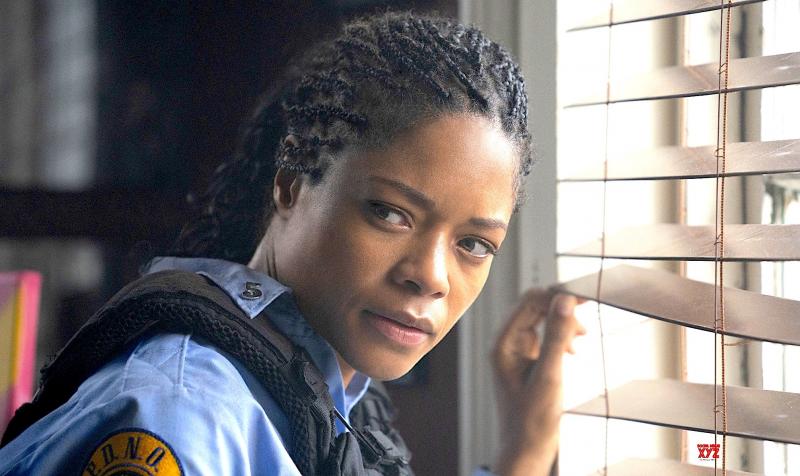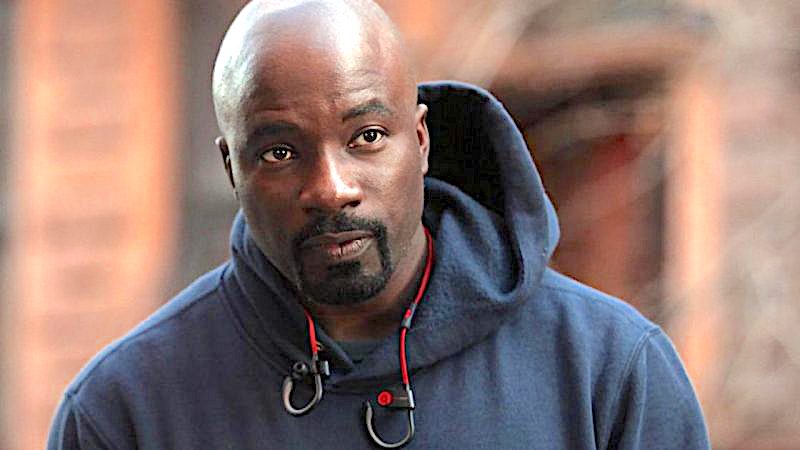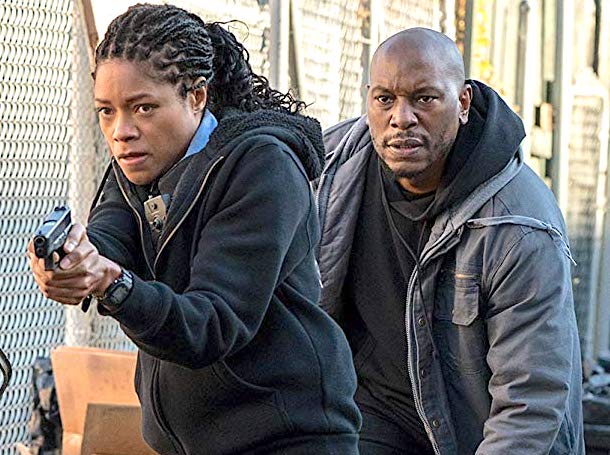Black and Blue review - police thriller aims high and misses | reviews, news & interviews
Black and Blue review - police thriller aims high and misses
Black and Blue review - police thriller aims high and misses
Big issues blot out character and plot in lacklustre bad-cop drama

Police corruption has fuelled many a Hollywood thriller, but sadly Black and Blue is no Training Day or The Departed.
Harris’s character is difficult to take seriously, since despite her apparently gruelling military experiences in Kandahar, she’s astonishingly naive about life on the streets or the probable nature of inner-city policing (not least in a city which has still never fully recovered from Hurricane Katrina). She might be new on the job, but let’s face it, it is her home town. Besides, for all their faults, the American police surely give their recruits a modicum of training?
 The local cops are male, macho, mean and mostly white, and regard the petite Alicia with a kind of scornful incredulity. The exception is her regular patrol partner Kevin (Reid Scott), who’s a laid-back guy with the personality of wilted lettuce. Especially toxic are the narcotics squad, headed by Terry Malone (Frank Grillo), the kind of cop who runs his own private vice network and who has become a commonplace of movies and TV drama (think Vic Mackey in The Shield). It’s when Alicia is temporarily assigned to patrol with officer Deacon that she gets sucked into Malone’s maelstrom of dark and nasty stuff.
The local cops are male, macho, mean and mostly white, and regard the petite Alicia with a kind of scornful incredulity. The exception is her regular patrol partner Kevin (Reid Scott), who’s a laid-back guy with the personality of wilted lettuce. Especially toxic are the narcotics squad, headed by Terry Malone (Frank Grillo), the kind of cop who runs his own private vice network and who has become a commonplace of movies and TV drama (think Vic Mackey in The Shield). It’s when Alicia is temporarily assigned to patrol with officer Deacon that she gets sucked into Malone’s maelstrom of dark and nasty stuff.
Director Deon Taylor and screenwriter Peter A Dowling want to make some points about ingrained police racism and social breakdown (the cops won’t even respond to callouts from run-down estates where poor black families live), but this is clumsily done. They get some mileage out of the way Alicia has broken away from her roots in the black community and is now regarded with hatred and suspicion by her former friends – it’s drummed into her that when you join the cops and become “blue”, you’re no longer black – but the characters are more like placards saying “alienation” or “fuck the police” than actual people with lives and personalities. The film gives the impression that the entire African American population of New Orleans (except for Tyrese Gibson’s stoical and selfless Mouse, pictured below) are tooled-up gang members always locking and loading for the next firefight.
 Among this parade of caricatures, Mike Colter’s pantomime ghetto kingpin, Darius (pictured above), stands proudly and absurdly above the rest (compare and contrast with Colter’s smoothly nuanced performance as the suave drug overlord Lemond Bishop in The Good Wife). As for the police, they’re presented as a drone-like army of subhuman thugs, the Borg of urban dystopia, with Alicia’s saintly integrity their only hope of redemption. We shall eschew spoilers, but the narrative develops exactly as you’d expect, assisted by a few implausible coincidences.
Among this parade of caricatures, Mike Colter’s pantomime ghetto kingpin, Darius (pictured above), stands proudly and absurdly above the rest (compare and contrast with Colter’s smoothly nuanced performance as the suave drug overlord Lemond Bishop in The Good Wife). As for the police, they’re presented as a drone-like army of subhuman thugs, the Borg of urban dystopia, with Alicia’s saintly integrity their only hope of redemption. We shall eschew spoilers, but the narrative develops exactly as you’d expect, assisted by a few implausible coincidences.
The future of Arts Journalism
You can stop theartsdesk.com closing!
We urgently need financing to survive. Our fundraising drive has thus far raised £49,000 but we need to reach £100,000 or we will be forced to close. Please contribute here: https://gofund.me/c3f6033d
And if you can forward this information to anyone who might assist, we’d be grateful.

Subscribe to theartsdesk.com
Thank you for continuing to read our work on theartsdesk.com. For unlimited access to every article in its entirety, including our archive of more than 15,000 pieces, we're asking for £5 per month or £40 per year. We feel it's a very good deal, and hope you do too.
To take a subscription now simply click here.
And if you're looking for that extra gift for a friend or family member, why not treat them to a theartsdesk.com gift subscription?
more Film
 Bugonia review - Yorgos Lanthimos on aliens, bees and conspiracy theories
Emma Stone and Jesse Plemons excel in a marvellously deranged black comedy
Bugonia review - Yorgos Lanthimos on aliens, bees and conspiracy theories
Emma Stone and Jesse Plemons excel in a marvellously deranged black comedy
 theartsdesk Q&A: director Kelly Reichardt on 'The Mastermind' and reliving the 1970s
The independent filmmaker discusses her intimate heist movie
theartsdesk Q&A: director Kelly Reichardt on 'The Mastermind' and reliving the 1970s
The independent filmmaker discusses her intimate heist movie
 Blu-ray: Wendy and Lucy
Down-and-out in rural Oregon: Kelly Reichardt's third feature packs a huge punch
Blu-ray: Wendy and Lucy
Down-and-out in rural Oregon: Kelly Reichardt's third feature packs a huge punch
 The Mastermind review - another slim but nourishing slice of Americana from Kelly Reichardt
Josh O'Connor is perfect casting as a cocky middle-class American adrift in the 1970s
The Mastermind review - another slim but nourishing slice of Americana from Kelly Reichardt
Josh O'Connor is perfect casting as a cocky middle-class American adrift in the 1970s
 Springsteen: Deliver Me From Nowhere review - the story of the Boss who isn't boss of his own head
A brooding trip on the Bruce Springsteen highway of hard knocks
Springsteen: Deliver Me From Nowhere review - the story of the Boss who isn't boss of his own head
A brooding trip on the Bruce Springsteen highway of hard knocks
 The Perfect Neighbor, Netflix review - Florida found-footage documentary is a harrowing watch
Sundance winner chronicles a death that should have been prevented
The Perfect Neighbor, Netflix review - Florida found-footage documentary is a harrowing watch
Sundance winner chronicles a death that should have been prevented
 Blu-ray: Le Quai des Brumes
Love twinkles in the gloom of Marcel Carné’s fogbound French poetic realist classic
Blu-ray: Le Quai des Brumes
Love twinkles in the gloom of Marcel Carné’s fogbound French poetic realist classic
 Frankenstein review - the Prometheus of the charnel house
Guillermo del Toro is fitfully inspired, but often lost in long-held ambitions
Frankenstein review - the Prometheus of the charnel house
Guillermo del Toro is fitfully inspired, but often lost in long-held ambitions
 London Film Festival 2025 - a Korean masterclass in black comedy and a Camus classic effectively realised
New films from Park Chan-wook, Gianfranco Rosi, François Ozon, Ildikó Enyedi and more
London Film Festival 2025 - a Korean masterclass in black comedy and a Camus classic effectively realised
New films from Park Chan-wook, Gianfranco Rosi, François Ozon, Ildikó Enyedi and more
 After the Hunt review - muddled #MeToo provocation
Julia Roberts excels despite misfiring drama
After the Hunt review - muddled #MeToo provocation
Julia Roberts excels despite misfiring drama
 London Film Festival 2025 - Bradley Cooper channels John Bishop, the Boss goes to Nebraska, and a French pandemic
... not to mention Kristen Stewart's directing debut and a punchy prison drama
London Film Festival 2025 - Bradley Cooper channels John Bishop, the Boss goes to Nebraska, and a French pandemic
... not to mention Kristen Stewart's directing debut and a punchy prison drama
 Ballad of a Small Player review - Colin Farrell's all in as a gambler down on his luck
Conclave director Edward Berger swaps the Vatican for Asia's sin city
Ballad of a Small Player review - Colin Farrell's all in as a gambler down on his luck
Conclave director Edward Berger swaps the Vatican for Asia's sin city

Add comment